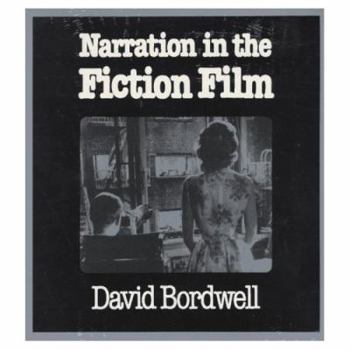Narration in the Fiction Film
Select Format
Select Condition 
Book Overview
Most films tell tales, but what does that involve? How do motion pictures tease us into building what we all agree to call stories? In this study, David Bordwell offers the first comprehensive account... This description may be from another edition of this product.
Format:Paperback
Language:English
ISBN:0299101746
ISBN13:9780299101749
Release Date:September 1985
Publisher:University of Wisconsin Press
Length:384 Pages
Weight:1.95 lbs.
Dimensions:0.8" x 9.4" x 9.6"
Customer Reviews
2 ratings
teaches new ways of thinking about cinema
Published by Thriftbooks.com User , 15 years ago
I used this book for a cinema/media theory seminar as a freshman at Princeton University. It is demanding and just plain difficult at times (I personally found chapter 2 super confusing). However, it achieves its goal: it provides one valuable way to discuss movies - by focusing on the narrative and its workings (another way that comes to mind is Lacanian psychoanalysis employed by Slavoj Zizek). Along the way Bordwell gives us some very useful vocabulary: syuzhet , fabula, diegesis (the narrative space), self-consciousness and communicativeness, internal and external norms, etc. Have you ever asked yourself what difference it makes whether the music you hear in a particular scene of a movie is diegetic (e.g. comes from a radio situated in the narrative space) or non-diegetic (i.e. is super-imposed)? Or how the narrative makes use of your expectations and hypothesis-building? If so, you will probably enjoy this book. The book also develops a valuable discussion of different "modes" of narration. Everyone knows the "classical" Hollywood narration (protagonist-driven plot, a problem that needs resolution, etc.). Bordwell uses the classical mode as the starting point to discuss the other ones. For example, Art Cinema narration depends precisely on violating the norms of classical narration. Moreover, Bordwell makes it easier to understand different modes by including long interpretations of various movies (Bertolucci's "The Spider's Stratagem", Bresson's "Pickpocket", Hitchcock's "The Rear Window", Godard's "Pierrot le fou" and many others). It would be very hard to absorb all of this book. Personally, I forgot most of the nuances and arguments discussed and precise terms used to frame them. However, the take-away is a whole new way of thinking and talking about film.
Delicious Film Theory
Published by Thriftbooks.com User , 24 years ago
As most films, like most novels, have some sort of narration flowing through them, David Bordwell's "Narration in Fiction Film" is a very useful and important book in the world of film theory. Laying out the different styles of narration into a few distinct categories and using a few films as examples by analyzing them in great depth (including Rear Window and Pickpocket), Bordwell takes a very deliberate and methodical approach to the delineation and understanding of films. The language he uses, such as the terms "syuzhet" and "fabula" to refer to different aspects of the plot, are difficult to comprehend at first but once learned provide a welcome ticket into the captivating world of film.





